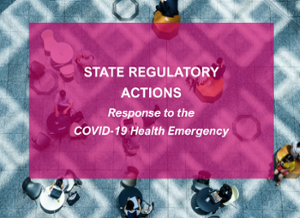Today's Regulatory Mix: Tennessee Awards $19.7 Million Broadband Grants, Senators Urge DOJ to Allow Free Calling for Inmates, FCC Waives Rules for VRS Providers During COVID-19 Pandemic
 Tennessee Awards $19.7 Million Broadband Grants
Tennessee Awards $19.7 Million Broadband Grants
Tennessee Gov. Bill Lee and Department of Economic and Community Development Commissioner Bob Rolfe announced $19.7 million in broadband accessibility grants that will expand service to support 31,000 unserved Tennesseans in nearly 12,700 households and businesses.
“One of my top priorities is ensuring the success of rural Tennessee. With the assistance of these grants, communities across 21 counties will now have access to broadband that will aid in that success,” Lee said. “I applaud the efforts of these 17 broadband providers as they play a fundamental role in our efforts to boost rural communities throughout Tennessee.”
The State continues to focus on expanding broadband access in rural areas. According to the FCC’s 2019 Broadband Deployment Report, nearly one in four rural Tennesseans lack access to broadband. In response, Gov. Lee has included $25 million in his fiscal year 2021 recommended budget to continue the grant program.
 Senators Urge DOJ to Allow Free Calling For Inmates
Senators Urge DOJ to Allow Free Calling For Inmates
U.S. Senators Amy Klobuchar (D-MN) and Dick Durbin (D-IL), along with Senators Bernie Sanders (I-VT), Michael Bennet (D-CO), Kamala Harris (D-CA), Sherrod Brown (D-OH), Ed Markey (D-MA), Chris Coons (D-DE), Richard Blumenthal (D-CT), Elizabeth Warren (D-MA), Tammy Duckworth (D-IL), and Ron Wyden (D-OR), wrote a letter urging the Administration to use new authority provided in the Coronavirus Aid, Relief, and Economic Security (CARES) Act to waive phone charges for incarcerated people to help families and loved ones remain in contact during the pandemic. The senators also asked that the Administration ensure that communications with attorneys remain confidential.
 The letter follows a previous request from senators on March 20. In-person visits at federal prisons have been suspended during the COVID-19 pandemic, and currently, calls can cost up to 25 cents per minute in addition to fees charged for each call.
The letter follows a previous request from senators on March 20. In-person visits at federal prisons have been suspended during the COVID-19 pandemic, and currently, calls can cost up to 25 cents per minute in addition to fees charged for each call.
“The Senate-passed Coronavirus Aid, Relief, and Economic Security (CARES) Act, which was signed into law on March 27, 2020, includes new authority for BOP to promulgate rules that would allow inmates to connect with loved ones through video teleconferencing and by telephone free of charge…we urge DOJ and BOP to take immediate action,” the senators wrote. “The new rule should also make clear that incarcerated people can make telephone calls, use video conferencing services, and send emails to communicate with an attorney in a private and confidential setting without incurring charges.”
FCC Waives Rules for VRS Providers During COVID-19 Pandemic
The FCC announced that, to ensure the uninterrupted availability of video relay service (VRS) during the COVID-19 pandemic, it was temporarily waiving certain restrictions on hiring contractors for American Sign Language (ASL) interpretation services. The temporary waiver applies to the Commission’s rule restricting VRS providers from contracting for video interpretation services with an entity that is not itself  an eligible provider. The wavier went into effect immediately on April 3 and will extend until May 15.
an eligible provider. The wavier went into effect immediately on April 3 and will extend until May 15.
The FCC emphasized that the waiver applies only to contracting for additional interpretation services and does not relieve VRS providers from the rule’s restriction on contracting for the provision of call center functions. It reminded VRS providers that they are responsible for ensuring that all handling of VRS calls by communications assistants, whether employed directly or through contracts with other entities, is in compliance with applicable, non-waived TRS standards. Any provider contracting for interpretation services pursuant to the waiver must file a report, no later than 30 days after the end of the waiver period, identifying each entity with which it has contracted for interpretation services and the number of conversation minutes handled by each.
____________________________
The Regulatory Mix, Inteserra’s blog of telecom related regulatory activities, is a snapshot of PUC, FCC, legislative, and occasionally court issues that our regulatory monitoring team uncovers each day. Depending on their significance, some items may be the subject of an Inteserra Briefing.






